Dear Steemit friends:
In today's post I will bring you on a very special tour of two very beautiful but very different places. Their contrast in historical significance as well as natural versus urban characteristics makes their exploration a beautiful symphony of nature and culture. The first place we will visit together in Sun Moon Lake in central Taiwan, located about an hour and a half drive from Taichung City. Sun Moon Lake is so called because half of it supposedly resembles a sun and the other half reportedly looks like a half moon. You just have to look at a map to realise that you'd have to have a pretty good imagination to see these shapes but it gives a beautiful name non-the-less!
After exploring the beauty of the natural body of water I'll then have you join me in one of Taichung City's military villages. There are hundreds of these military villages scattered all around Taiwan which are the remnants of a pivotal part of Taiwan's history. In 1949, Chiang Kai-shek, who at the time was considered by most of the world to be the legitimate ruler of the Republic of China (ROC), was forced to withdraw from mainland China to Taiwan when the Chinese Civil War with the Chinese Community Party (CCP) reached a head. He and his government (Kuomintang or KMT) fled the country to Taiwan but always made claims that they would one day re-take mainland China from the CCP.
During this massive upheaval, over 1 million soldiers were relocated from mainland China to the 14,000 square miles of the island of Taiwan. But what to do with all of these soldiers? Well, at this time the ROC built hundreds of villages to house their soldiers and their families. These villages were only intended to be temporary because the official party announcements were that they would soon be re-taking mainland China. As a result, many of these villages were poorly built and the years have been unkind to many of them.
Before we visit one, very unique, military village, first we will visit the Lake!
Sun Moon Lake
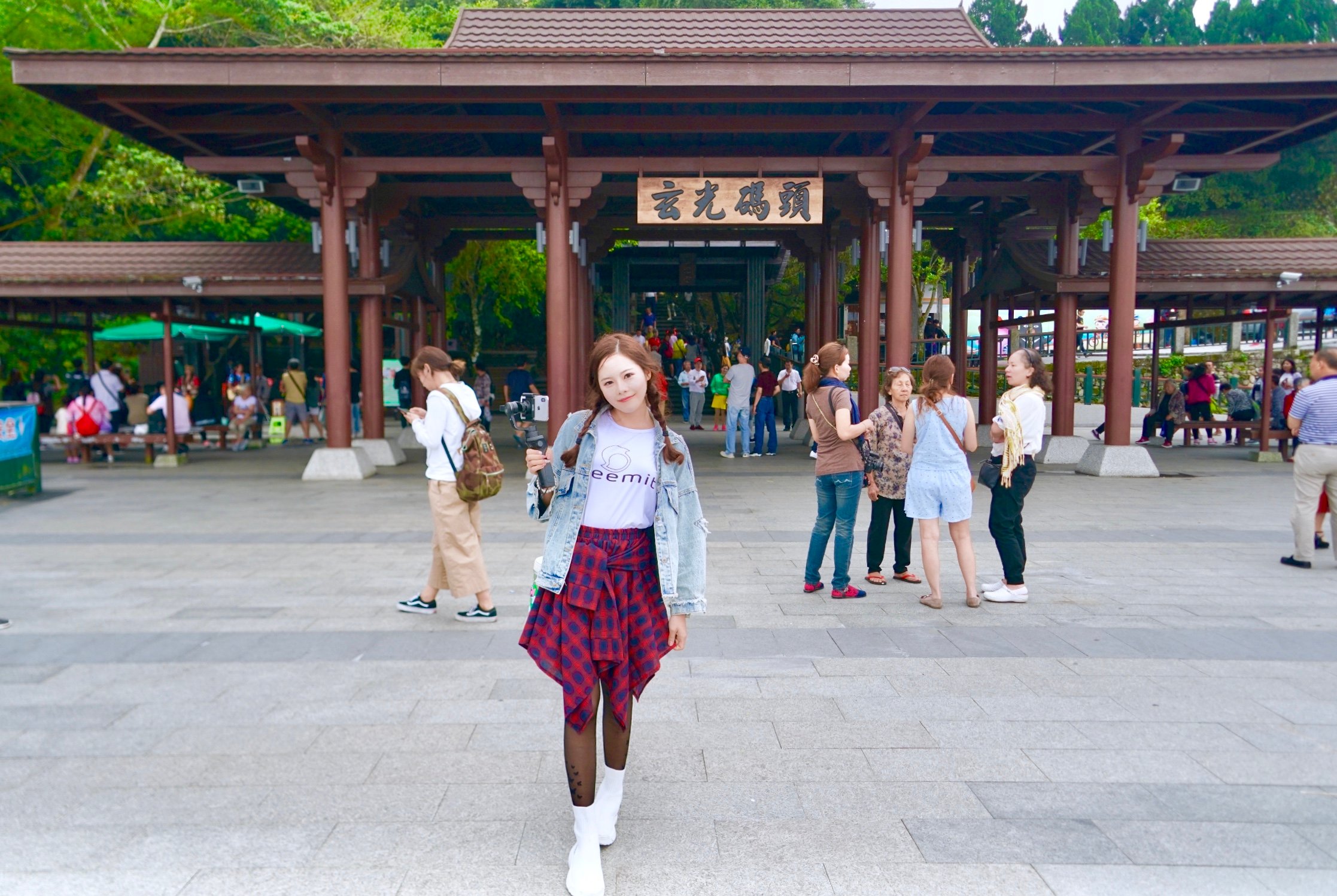
Sun Moon Lake is located in central Taiwan in Yuchi Township in the Nantou Region. It is the largest body of water in all of Taiwan and is about 8km² and 27 metres deep at its deepest point. It sits 748m above seat levels, nestled in the beautiful mountains of the central ridge of mountains. As you will see, this area is known for its beautiful greenery covering every inch of the mountains and there are hundreds of hiking trails all around the lake. These are famous for their beauty and astounding views of Sun Moon Lake below you as you hike.
There are some buildings surrounding the lake, mostly catering to tourism such as hotels and harbours for tour boats, as well as the small Township of Yuchi. However, other than these few landmarks, as you explore the lake you are mostly afforded beautiful views of the local nature and countryside. After very rapid growth in the 70s and 80s, where many cities in Taiwan exploded in size and industry, the Taiwanese government have gone to great efforts to preserve the natural beauty of the landscape, which can be see in areas like this one!

Other than hiking, the best way to see the lake and enjoy the natural surroundings is by boat. As a result there are many harbours and piers for tour boats around the edge of the lake. Tourism is big business here and there is fierce competition between different tour operators, all trying to provide better boats and better service than their competitors so that you join their tour of the lake.
Sun Moon Lake was declared one of thirteen national scenic areas in the country and is one of two in central Taiwan. Because of this, residents of Taichung one of the closest major cities like to spend time to visit here and enjoy time away from the city. Many people picture Taiwan as a place of urban, financial and technological cities and because of this miss out on so much natural beauty that the country has to offer as well.


Though there are many piers around the lake, I chose to set sail from Xuanguang Harbour in the south of the lake. It is very popular because it is closest to the famous Lalu Island in the centre of the lake, and also gets you away from some of the built up areas of the Township in the north of the lake. It has four large piers with moorings for many different tour operators. It took me a long time to research the best one!
Lalu Island tells some of the history of the lake. In the 1930s the Japanese built a dam further up the river which outlets from the lake, causing the water levels to rise. This caused floods of the area and some temples were destroyed because of it. Before this time, the island was much bigger and would have cut the lake mostly in two, creating the sun and moon shapes that give Sun Moon Lake its name. Now completely tiny, it used to house a wedding pavilion built in 1978, but that was destroyed by an earthquake in 1999 which caused even more of the island to sink. You will see the island later!


While waiting for the start of my tour, I heard music and went to investigate! Just off the main harbour area a live band were performing, much to my delight. They had bongo drums, electric guitars and singers in very colourful dress. I sat and listened for quite a long time, enjoying the live music and admiring their skill and talent.
I think they were selling some CDs of their music, and I was just considering buying one as a remembrance of this place when I suddenly looked at the time, I was going to be late! I had been so excited to sit and listen to the live music of these very talented people that I had lost track of time. I had to leave them to make sure I didn't miss my boat and I didn't get my CD but I have very fond memories of the live music by the lake side.

When I reached my boat I let out a little gasp of joy - my boat had a huge gold horse on the front of it! How beautiful. I suppose all of the white boats probably look the same so they have tried to make theirs more recognisable - and recognisable it is! I was about to ride off into the middle of the lake on my gold horse tour and I couldn't have been more excited.
As we left the harbour there was a much better view of Lalu Island as we got closer, as well as lovely views back to the harbour. As you can see, there are plenty of hotels for people wanting to escape the big cities and stay in a hotel with a beautiful view of the lake. As we headed off, I was told by my guide that Lalu Island was very important to the local area, and that is because of its slightly different name.
Sun Moon Lake has been home to the aboriginal tribe called the Thao. The Thao people have lived around the lake for hundreds of years and are one of a few aboriginal people still living in Taiwan. They are reported to be the smallest tribe still left in Taiwan, with counts being made in the year 2000 of just 281 people. They still maintain their traditional way of life and their own language - and that is why Lalu Island is so important. Out of honour and respect for these indigenous people the island was named in their language after the 1999 earthquake which left 80% of the people without homes or jobs.


My boat tour was not long, but it was enough time to truly appreciate the beauty of the area. I loved seeing all of the natural beauty surrounded by water with the wind in my hair. I can see why the Thao people chose to make this place their centuries long home and have chosen to stay here after all of these years and developments. I am so privileged to be able to share in the beauty and nature of this place with its local people and I am glad that much of the natural beauty of the area has been preserved.
It is not easy to strike the balance between preservation and progression in a place like this. On the one hand, people come to the area for the natural unspoiled beauty, but on the other hand they wouldn't be able to come if there weren't roads, places to eat, places to shop and places to sleep. I think that Sun Moon Lake strikes a good balance and I am so happy that the aboriginal people are being honoured, recognised and respected more than they have in the past.

Upon my return to the steady shores of the land, I still had a little time to explore before my ride back to Taichung so I did a little exploring of the pier. All of the other boats were white but look at this bright red boat! You know me, I love colours (as you'll see even more later) and this one certainly stood out from the crowd.



Never one to resist exploring for every minute I have available, I began exploring the start of some of the hiking trails leading up into the mountains behind Xuanguang Warf and discovered this beautiful view of Lalu Island. From this better viewing point, you can better see the unique shape of the island. It is almost a circle of land in the middle with trees on top, surrounded by water, and then surrounded by another circular strip of land. It is most unique and beautiful.
I imagine it must have been a wonder to look at before the damming up of the river, but it has a certain quaintness now that is very special. With just a few trees in the middle, and a belt of green grass surrounding it, it's like nature has framed its own creation. The growth of the trees represents how life can flourish anywhere and the natural framing of the lake, and the unique shape of the island, show this off beautifully.
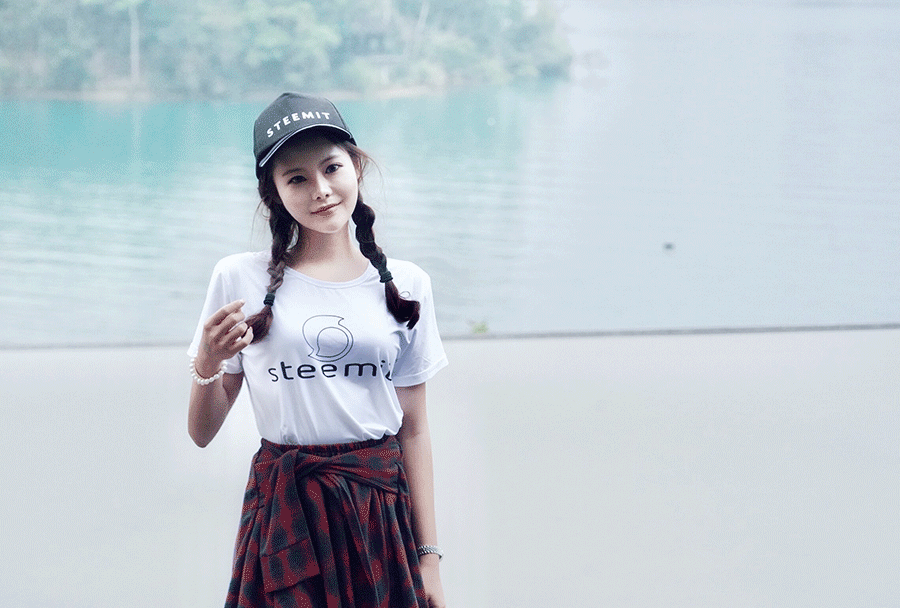

On the way back to Taichung City my tour guide stopped at a rather large, utilitarian looking building. Why were we stopping here I wonder? He told me that this was a secret viewing spot that not all tours would go to. When I looked at the sign it said, "Sun Moon Lake National Scenic Area Management Office". It seemed very strange that we would come to view some government administrative offices but he assured me that it was well worth the stop.
The building was very unique and was set up right next to the lake and then I saw the view! Turns out this was a beautiful view point from which to see a different part of the lake and it was beautiful to see some different angles of the largest lake in Taiwan. Who would have thought they would build a government office in such a beautiful spot - what a great place to work and look after the running of the scenic area, reminded every day of why you're working to keep this place beautiful.
Rainbow Military Dependent Village, Taichung
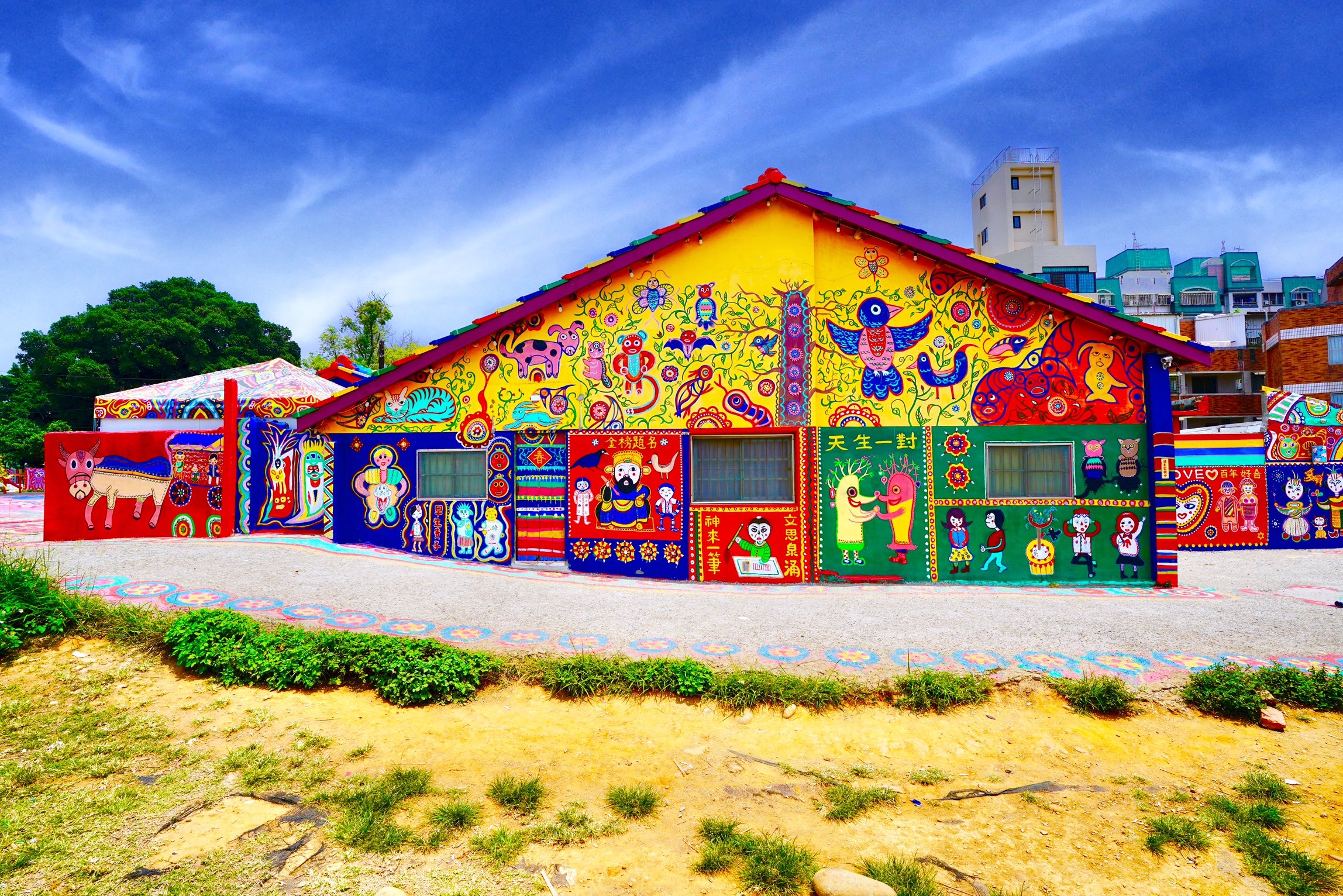
Now friends, we have explored nature together and seen the history and culture of one of the natural wonders of Taiwan. Now I want to take you to the exact opposite place. A place of urban recent history, decorated, restored and preserved by the creativity of people. Welcome, to the Rainbow Military Dependent Village!
Hundreds of these villages were built to house the retreating armies of the KMT after losing the Chinese Civil War, both for soldiers and their families. They were built quickly and poorly and in recent years, many of them has been destroyed by the government. The cultural debate is still ongoing because these villages provide historical insights into the past of the country and are very interesting to explore. As you can see in my past blog HERE they come in many different shapes and forms. This one, comes in the colourful form!

The Rainbow Military Dependent Village is the creative child born from Mr. Huang who was a staunch supporter of the KMT, born in Hong Kong. When the KMT and their armies moved to Taiwan, Mr. Huang moved to this village in Taichung and lived there ever since. In 2008 he came up with the idea to start painting the village as a way to brighten up the decaying buildings which were suffering from neglect and their poor build quality.
Starting on his own house, he started painting huge, colourful works of art all over the walls. There's no particular theme and you can see faces, animals, patterns and shapes scattered over every single exposed surface of brick. Mr. Huang, now in his 80s, has been the champion for this village and keeping its beauty alive. It took him many years but he painted the whole village block in these beautiful colours - a real labour of love.

The local government did have plans to tear down the old Military Dependants Village as had been done to hundreds of other villages all over the country. However, thanks to Mr. Huang, it has become one of the most popular tourist attractions in Taichung and there have been petitions with thousands of names on wishing to keep it around. Fortunately, at this time, those petitions have been heard and there are no longer plans to demolish this rainbow of colour.
There are now full tourist maps of the village which show all of the different areas of the village and what you can see there. There is even a play park for the kids who must also love the colours. However, it's most fun to just start walking, getting lost, and admiring all of Mr. Huang's work. As well as families, the place is now extremely popular with artists and photographers, and you can see why! I was completely in heaven, finding great lighting and angles everywhere I looked because the vibrant colours just make everything look beautiful.

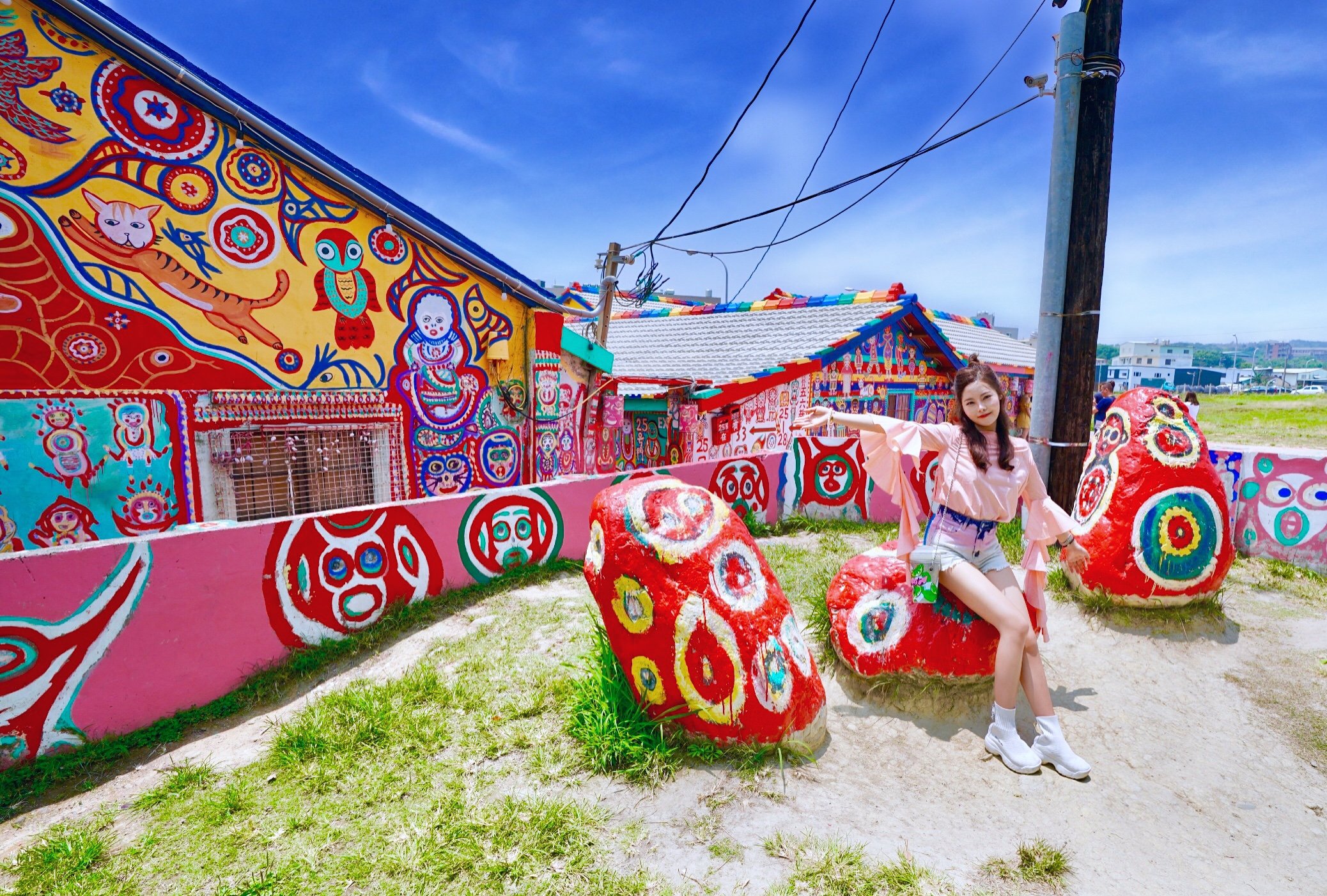

Mr. Huang has single-handedly saved his village from demolition and his unique art style is even studied by local art students from the university. But all of that only started 10 years ago. Before putting his first paint to brick in 2008, Mr. Huang had never painted anything in his life. He is completely self taught and through thousands of hours of practice over thousands of square feet of building exteriors, his talent developed rapidly. Typically featuring fun, friendly and well known images from TV or animals from the natural world, Mr. Huang has created a place both to be appreciated by adults and adored by children.



As you can see, the paintings are all done in the same bright paints but some of the paintings are far more intricate than others. Painting a little bit each day, Mr. Huang's talent can be seen to develop as you look from wall to wall. Paintings which were nearer the start of his 'career' are more simple, with the lines being quite rough, though beautiful non-the-less. As he continued to paint his art became more complex, crisp and ornate.
I really love both styles and I love the endeavour used to create these works of art. Did our artist think he needed to be perfect? Did he set out with a particular style in mind? No, he just started painting for the joy of painting. Like many things in life, doing a little of something every single day, with love and passion, and you'll become better and better. Most people would never start something this big because the task seems too daunting or they don't feel like they can do it. But not Mr. Huang! Even late in life, he took on this huge project, and with daily work it was only a few years before the entire village was completely covered in paint!



As you can see, now even the concrete floors have been painted in the same beautiful style. You can see this open area of concrete which would have represented the extent of the children's play area for the military families living here. With many families and people living here, the space would have been very cramped with whole families being forced to live in just one or two rooms. The public open spaces, like this space area here, were also extremely small and wouldn't have afforded much space to live or play in.


I think you'll agree, this is one of the most lovely places to spend time in. It was liberating to just be here, and I felt like a little kid again. If you remember children's TV shows as a kid you'll remember that they'd always be extremely colourful and the people and characters would have so much fun exploring their colourful world of different characters - and that's what I felt like! I felt like I could have just walked into a TV show.
What Mr. Huang has done here is extremely special. He has saved a part of modern history by making it in to modern art that can be enjoyed by every generation. I had hours of fun photographing every possible angle that I could and I had to drag myself out of the place. Upon leaving, the normal world of the city looked so bland and boring and grey. We could do with more Mr. Huangs in this world to bring more colour and joy to our surroundings.
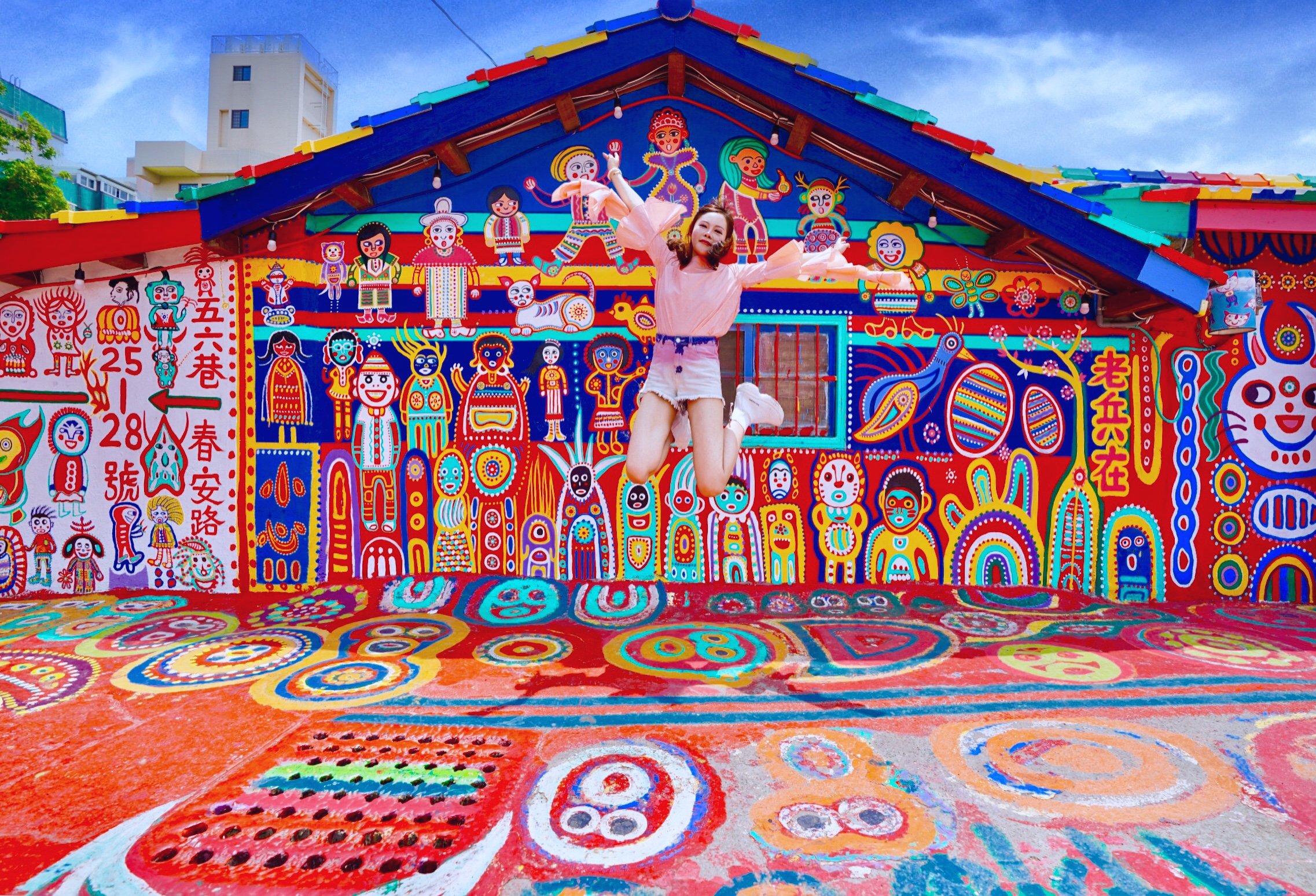
Enjoying a simple and relaxing dinner after a long day
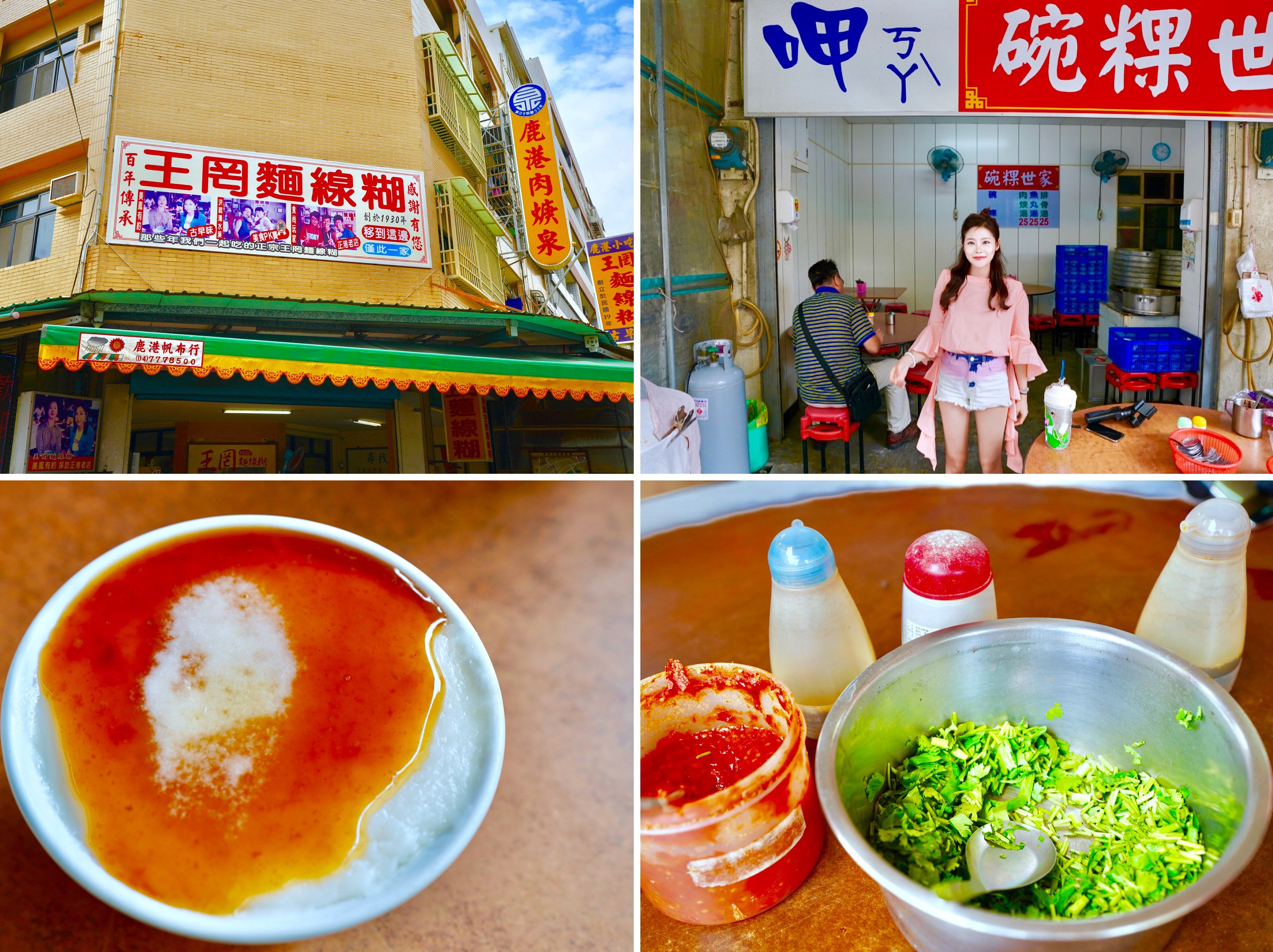
I decided I didn't want to go far for dinner so picked a busy little restaurant on the corner of a nearby street and settled in to try some tasty local food. Most of the time I am pleasantly surprised by the quality and flavour of the dishes in these lovely little local restaurants. With competition being so fierce in big cities, anywhere not serving nice food just doesn't survive! I love discovering these little gems and eating as the locals do.


Not wanting anything too fancy I got myself some rice noodles as a bit of a starter, though I certainly got a full bowl! Really simple but really well flavoured, I enjoyed the rustic flavours of the chicken broth and fine white noodles.
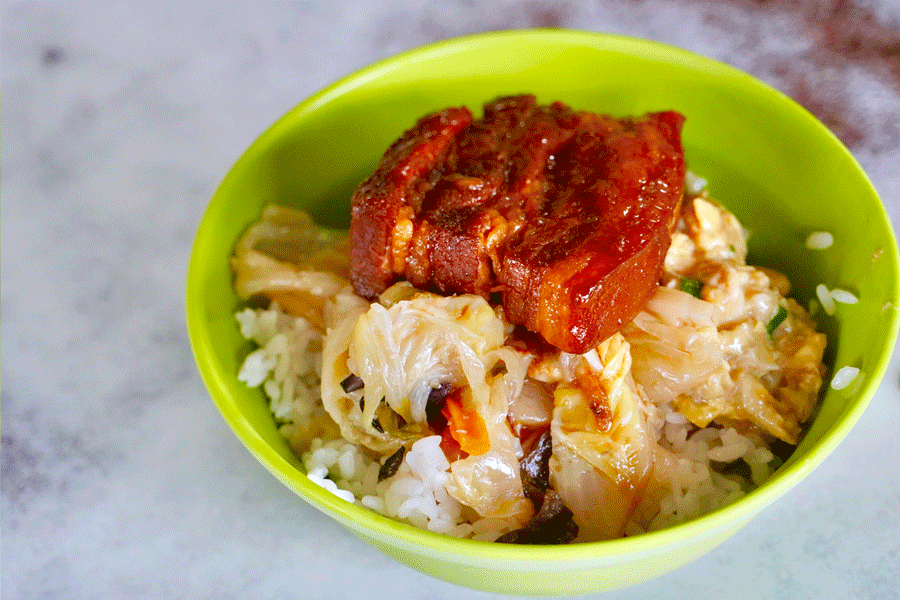
For a bit of extra filling I also got this beautifully cooked pork which had a sticky glaze, on a bed of vegetables and rice. Really tasty. Lastly, I had a dessert of sweetened rice in a kind of pudding with syrup on top. It was very rich and a little slimy but it tasted AMAZING! I couldn't finish it however - too much rice in one meal!

My Steemit Friends, I hope you've enjoyed today's exploration. In one day I went to visit the beauty and majesty of nature at Taiwan's largest lake, Sun Moon Lake where I got my fix of the natural world and learned about the history of the aboriginal peoples who lived there. I felt this was a real dip into Taiwan's beautiful countryside and native history and I could have spent a few days there just walking around the lake and admiring the views and scenes of the outdoors.
In direct contrast to the simple greens and blues of the countryside, I visited almost the exact opposite place. A place that represents fast expanding urban sprawl, building and land disputes and modern history. The Rainbow Military Dependent Village reminded me that Taiwain has a very recent history of controversy but that it is also values that history. Understanding that everything in a countries history creates its current culture is very important and this example of a Military Dependent Village shows how current generations have embraced their past, but build their own culture around it.
My favourite part of my travels today would have to by Rainbow Village. Mr. Huang has left a legacy for future generations that everyone can enjoy. He has made something broken and ugly into something beautiful that the people are proud of and want to preserve for all to see, visit and enjoy. I hope you've enjoyed my travels today as much as I have enjoyed writing about them. Which would you say was your favourite picture from today and why? If you've liked my blog please follow me and vote for this blog to see more!
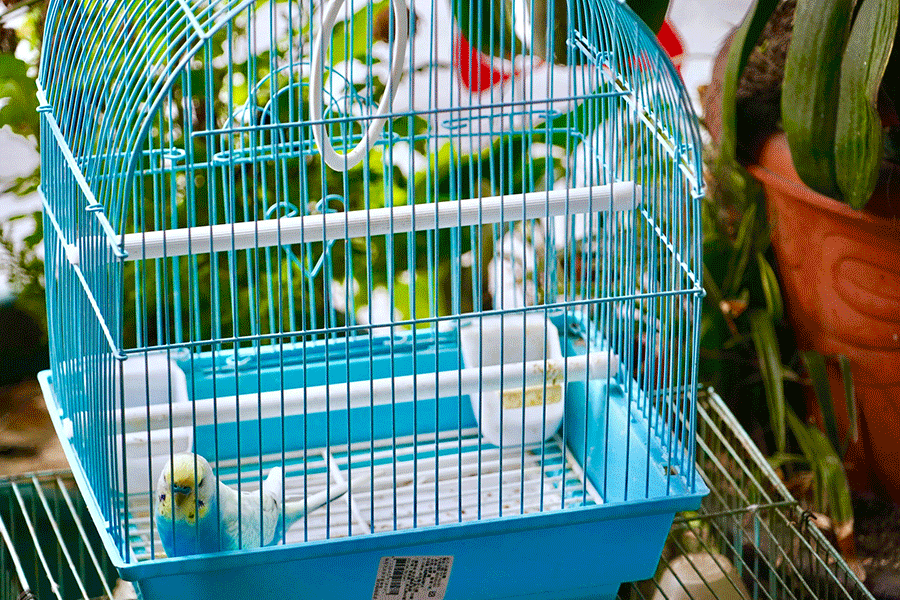

想起小时候第一次从学校课本里了解到的台湾,印象最深刻的就是那篇描写日月潭的课文了,日月潭似乎是台湾自然风景名胜的代名词。有着“宝岛明珠”美称的日月潭是台湾最大的淡水天然湖泊,湖内自然生态丰富,湖水碧绿且深,那里有着群山环绕,树木茂盛的壮丽景观,周围有许多名胜古迹,清晨,日月潭好像披上轻纱,周围的景物一片朦胧,就像童话中的仙境,从小我就憧憬着去仙境看一看。想不到这次的台湾之行,竟然实现了我多年的小心愿。
日月潭位于台湾南投县日月村,从台中坐车过去大概1个半小时的路程,日月潭由日潭和月潭组成,由于双潭水色各异而得名,很有意思。在开往日月潭的途中,还可以看到窗外一片片排列整齐的笔直宾郎树,在那一带随处可见。阴天的日月潭别有韵味,游览日月潭有几种不同的方式,比如坐游艇环湖、日月潭缆车、日月潭自行车道环湖还有就是环湖的步道,无论哪一种都是不错的体验方式。我选择了坐船环湖,因为我一直觉得只有亲近潭水,才能最真切的感受这一抹碧绿潭水的动人之处。
日月潭有三处的游船码头,水社码头、伊达邵码头还有玄光码头,游人可以自由选择顺向或者逆向两条航线,在三个码头间循环航行。在码头买好船票,就开始了绕行日月潭仙境的旅程。随着游船开动,剥开湖面晶莹剔透的潭水,才发现碧绿的潭水清澈见底,能见度达10米以上。没有阳光的照射,反而让周围的景物透出一片秀美宁静的气氛,四周群山环抱,林木葱郁,一阵微风拂过,凉爽极了。无论是湖畔还是山景,都好似自带滤镜效果,清澈干净的仿佛没有一丝尘埃,在如画般的风景里穿行,让我心旷神怡。似乎也要感谢阴天,让我真正欣赏到了课文里描述的梦幻般迷人仙境,湖面上漂浮着薄薄的迷雾,翠绿的山峦上也仿佛披上轻纱,当水雾轻轻飘过我所在的船只,真的感觉像在梦境中穿行。
当游船前行到了湖中央,有个美丽的小岛浮现在眼前,因此就形成了“青山拥碧水,明潭抱绿珠”的绮丽景观。这座小岛把湖水分成两半,北边像圆圆的太阳,叫日潭,南边像弯弯的月亮,叫月潭。在船上,远眺欣赏日月潭的风景名胜景点的水社山,我还听到了很久很久以前流传着的动人神话传说,相传一位勇敢的青年大尖和一位美丽的姑娘水社相互爱慕,常常在大树之下相约,直到有一天,太阳和月亮被一个神秘的怪影吞掉了,整个大地陷入一片黑暗。后来才得知是两条住在黑水潭的妖龙偷走了太阳和月亮。于是大尖和水社决定要救出太阳和月亮,便开启了他们跋山涉水寻找妖龙的征程,很快在小动物的帮助下,他们找到了可以制服妖龙的金剪刀和金斧头,杀死了妖龙,救出了太阳和月亮。因为这个感人的传说故事,后来的人们便叫这里日月潭,而大尖哥和水社姐决心守护在潭水边,保护太阳和月亮,天长日久就变成了大尖山和水社山。
第一站我们的游船就停在了离湖中拉鲁岛不远的玄光码头,这个码头位于日月潭著名的玄光寺脚下。刚刚走上码头,就听见不远处传来悠扬的歌声,走近一看原来是原住民们现场演唱的传统民族歌曲,歌声飘扬在碧波荡漾的潭水之上,把原住民的文化深深融入在日月潭的美景与精髓当中,一切是那么贴合,让人为之沉醉。在玄光寺下,可以和刻有日月潭的标志石头合影,这大概是出现在游人相册里最经典的画面了。在玄光寺后面可以登上一条青龙步道直达玄奘寺,沿路有鲜花绿草相伴,环境清幽雅致。
探索完梦境般的日月潭,是时候为接下来的旅程补充下体力了,这是我第一次吃台湾的另一种饭类小吃——焢肉饭 ,焢肉饭炖煮猪肉的方式与平时常吃到的卤肉饭很不一样,相比卤肉饭里的碎肉,这里的猪肉是一整块猪五花肉,肉的品质上乘,香而不腻,还加入了高汤烹煮的白菜,鸡蛋作为配菜,老板递上来他们自家制作的私房小辣酱调味料,配在一起真的好吃到停不下来,很想再吃第二碗。
下一站我们一起去台中的彩虹眷村看一看吧,一直关注我的朋友一定知道,在旅游途中,我很喜欢去探索那些色彩绚丽,又饱含历史文化故事的人文景观,彩虹眷村自然被列入到了我的台中旅游清单里面。彩虹眷村位于台中市南屯区春安路的56巷,是一条色彩缤纷,充满童趣与创意的彩绘巷道,无论是地面,墙上,屋内屋外全部画满了生动活泼,五颜六色的人物形象,景观和充满丰富想象力的色块图案,这里不仅是激发人们生活情趣,想象力与创造力的艺术圣地,给人们带来了无限的快乐与正能量,也满满倾注着令人感动的独特当地文化元素和历史背景,因此这里成为了大部分游客必来观赏的景点,也让这片原本孤寂的眷村再次变成了聚集热闹气氛和相机菲林的人气焦点。
来到彩虹眷村,映入眼帘的是可爱梦幻的涂鸦,奇思妙想的色块,让人的心情瞬间变得无比舒畅,眼前一片美好,充满希望的光景,就算在夏天里烈日的考验下也可以继续神采飞扬。据说这里也是外国游客们最爱拜访的治愈系彩绘艺术村,而这片色彩缤纷的童话涂鸦王国全都出自于彩虹爷爷——黃永阜之手。眷村是1949年国共内战后撤离来台的军民亲属和政府人员定居台湾的村落,随着历史的演变,如今的眷村已经成为台湾文化和历史里不可或缺的重要历史文化资产。而本来面临拆除的彩虹眷村历经风雨,在黄爷爷的画笔下被赋予的新的生命和重要的文化意义,重新展现出耀眼的光辉魅力。
2008年8月,黄爷爷为了排遣无聊决定开始画画,随着眷村的墙上,地面,窗子,房门甚至井盖上被披上一层彩色的绘画风衣,原本古朴老旧的眷村也看起来焕然一新,黄爷爷越画越起劲,不仅引来周围的邻里陈赞,更是提供了自家的空间,让黄爷爷施展画笔下的才艺,那种对于生命的挚爱,美好生活的期许通过黄爷爷的画笔,传达给了每一位前来拜访眷村的游人。大胆活泼的用色,人物身上童趣的线条,粉色,蓝色,黄色,绿色,这些色彩仿佛从油漆桶中泼洒而出,点亮了整个眷村,地面架上了彩虹桥,墙上开出花朵,门上写着祝福的话语,水牛,小鸟,飞机和小岛都是黄爷爷笔下创作的元素,连最有人气的熊猫“团团圆圆”也成了彩虹眷村墙上的吉祥物。我也立刻拿起相机拍不停,希望留下每一抹瑰丽彩虹的倩影。恋恋不舍的离开眷村之后,我去尝试了台中特色的多元化小吃面线糊和碗粿。面线糊有着独特的味道,里面的配料也有创新。而碗粿则是我第一次吃,口感十分Q弹,里面有肉,香菇和酱汁,蒜泥提味,吃起来带一些台湾南部的甜味。今天的台中彩虹之旅就要告于段落了,之后还有更多有趣的台湾游记想要和大家分享。
My video is at DLive

